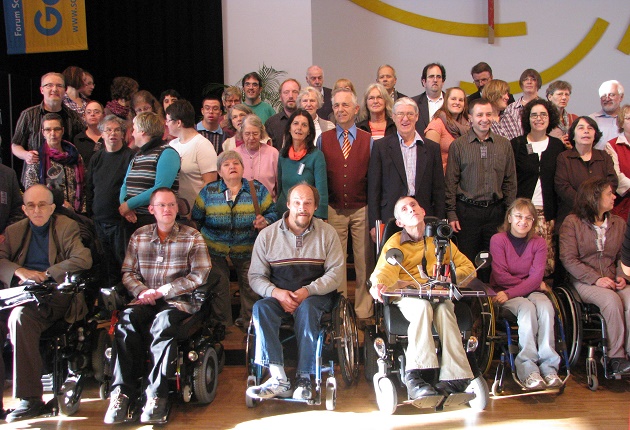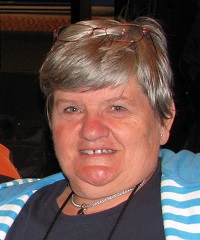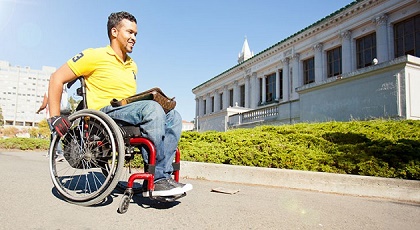How can the church better include people with disabilities? What was Jesus Christ's approach? Thérèse Swinters (European Disability Network) speaks from her own experience.
 Participants of an EDN meeting in Stuttgart (Germany). / EDN
Participants of an EDN meeting in Stuttgart (Germany). / EDN
What does Jesus tell us about people with disabilities? And what are some examples of good practice?
 Thérèse Swinters.
Thérèse Swinters. In the first part of an interview with Evangelical Focus, Thérèse Swinters spoke about the challenges in the European church context. “The biggest problem has been to get the issue of disability spoken about - just getting it into the agenda at all”, she said.
But there are also “a lot of good things going on”, the European Disability Network (EDN) believes.
The United Kingdom is a place where important advances have been made. “There are a lot of churches with good practices to different disability peoples groups there”. A good example is Prospects, a Christian organisation that “brings the gospel to learning disabled adults in more than 200 groups, working with local churches”.
Another example can be found in Ukraine. Fimiam works in areas like transportation, summer camps, a crafty handwork studio, and “they have seat up the Agape rehabilitation complex in one of the cities, Lutsk”.
“You could do interviews with almost every partner mentioned in our website”, says Swinters.
Why have they been successful? One key thing is that “all those people who took the initiative in a ministry of this kind are members of very supportive local churches”.
JESUS AND THE ISSUE OF DISABILITY
Churches should be strong in working with people with disabilities because it was Jesus himself who showed the way forward.
Jesus’ words in the Gospel of Luke 14:13-14 are an example of this: “When you give a banquet, invite the poor, the crippled, the lame, the blind, and you will be blessed. Although they cannot repay you, you will be repaid at the resurrection of the righteous.”
This is an “irrefutable mandate to the church to reach out to people with disabilities with the gospel”, author Dan’l Markham writes in his book “The Lost Mandate”. Christ called “to go out with the whole Gospel and, with love, compel all people with disabilities to come in. So that the Father’s house may be full. That they might know His awesome power in weakness. And that all may worship Him together”.
In one of the episodes described in the gospel of John, one can see an usual misconception among Christians. Jesus is asked by his disciples about the type of sin that had brought a blind man to his condition.
“Why are we always asking: ‘whose fault is it?’ Why do parents feel guilty about a disabled child? We should hear more teachings about the Lord who tells us that it is not about us”, says Swinters. “It is about Him, about His glorious being”.
SPIRITUAL HEALING VS. PHYSICAL HEALING
Jesus spoke of two types of healing: physical and spiritual. The chapter 2 of the Gospel of Mark shows this clearly. “The Lord talks first about His sin and then, almost as proof that He is The Lord, He gives healing”. “In these days”, says Swinters, “I very often hear about Christians meeting to get ‘healed’. But the Lord makes a difference between our spiritual condition and practical physical conditions”.
“We need to be free from the slavery of sin but a disability is not a slavery if we put it in the hands of our Lord. Maybe He will restore the disability but maybe not”.
DIFFERENT DISABILITIES, DIFFERENT CHALLENGES
Different groups of disability may require different approaches:
- Physical disabilities: “People who have a physical disability, very often a mobility disability, but have the capacity of normal learning. A lot of these people had their bodies functioning normally. Suddenly they have to rethink their daily life. It becomes a very big issue for them”.
In this case, “churches are very often not physical accessible. For example, a pastor cannot preach anymore in his church because he cannot reach the pulpit anymore – stairs are not for a wheelchair user! But, very often the congregation does not have the courage to help him on his way back to his previous responsibilities although, with some adaptations, it would be possible. This is an attitude problem for the leaders and congregation”.
 Photo: Berkeley University.
Photo: Berkeley University.- Learning disabilities: This includes Down syndrome and many others. “In this case the capacity to learn on a high intelligent level is not possible and even daily learning and rules are not possible to understand for many, they need daily attendance and guidance”.
“This means that they need special guidance to learn about God, Jesus as their Savoir. Here it seems that we promote exclusion but we have to think seriously. A special class for children is not excluding the children from our community. Why do we exclude our learning disabled youngsters or even the adults with a learning disability?
“A very general misunderstanding is: ‘these people with learning disabilities cannot understand the Bible so we should not bother’. Or, ‘they are accepted by the Lord anyway, we do not have to bother’. But the reality is that the only way to get to the Father is trough Jesus Christ, also for these people, at least for the part that we need to do in bringing the gospel to all people”.
- People with vision or sight loss: “Before the time of beamers, video, etc, people with this impairment could for the biggest part be included in our church communities without lots of questions or problems. Very often they were preachers, Bible study group teachers etc.”
“Nowadays that becomes more difficult. How can they sing with the congregation if they cannot read the lyrics of the songs, how can they know the notices or how can they follow a talk if a lot of bullet points are projected on the wall and nobody reads them out loud? We have made it more difficult if we are not willing to read or explain (f.e. pictures) everything out loud”.
- People with hearing loss: “Do we ever think about them as people with a disability? A lot of people who were born with hearing loss or mostly deaf people they are within the ‘deaf culture’. They refuse to call themselves people with a disability or handicap. They say: ‘we only speak another language: sign language’. If that is right, why do we provide translations in other languages and not into sign language?”
“A lot of deaf people do not understand sign language. What kind of efforts do we do as normal hearing people to include our friends?”
- Not visible disabilities: “Misformed organs can give disabilities (kidney problems, weak lungs, weak heart from birth, allergies of all kinds, etc). Very often they are not taken seriously: ‘you look so good’, people say. Since disability very often is forgotten by ‘normal’ people, these disabilities are the most forgotten ones. That is so very difficult for the person who lives with it”.
EVERY PERSON IS UNIQUE
Even though these group of disabilities help us to understand the issue, “persons who live with a disability are never classifiable in a group, especially not in church”, adds Swinters.
“They are as variable as other people because the disability can come in a lot of degrees of difficulty and the person can cope with it in so many different ways”.
Therefore, “we need to respect each person as an individual and look at his disability as a small part of his identity”.
HOW TO GET INVOLVED
All ministers and working groups related to the issue of disabilities are “very thankful” when new people join them.
Thinking of the EDN, Swinters says: “In the near future we would love to find some skilled people to write for us and some people who can teach about the Disability issue everywhere in Christian communities: conferences, Bible schools and colleges, churches and denomination gatherings”.
“All kind remarks about our work are welcome. We always appreciate prayer and support”.
MORE ABOUT EDN
The European Disability Network brings together national organisations and local ministries to work together. Since 2001, the platform has met in countries like Switzerland, Hungary, Albania, Spain, the United Kingdom, Ukraine, Germany and Austria. The next international conference is planned for 2018, in Riga (Latvia).
You can visit the website of EDN here. Listen to resources on disability and Bible here. Learn about the book “Making Church Accessible to All” here.

Las opiniones vertidas por nuestros colaboradores se realizan a nivel personal, pudiendo coincidir o no con la postura de la dirección de Protestante Digital.
Si quieres comentar o